Did you know that we spend about one-third of our life sleeping or at least trying to fall asleep? Most of us love to sleep. It helps us rest, reset and rejuvenate. But all of us have our own favorite sleeping positions and different types of sleeping position can offer different benefits.
Well, there are mainly three types of sleeping positions – back, side, and stomach. While the position may vary a bit depending on the sleeper, these three positions are among the most popular. But which one is the perfect posture to sleep? And how does sleeping position affect health?
That’s what we are here to find out today. Whether you sleep on your side, back or stomach, it is essential to know about the different types of sleeping position and how it can affect our health so that you can have comfortable and uninterrupted sleep.
Types of sleeping position
Your sleep position can significantly affect not just the quality of your sleep, but also your health and overall well-being. So let’s explore the various types of sleeping position and their benefits to learn what’s the best sleeping position for you.
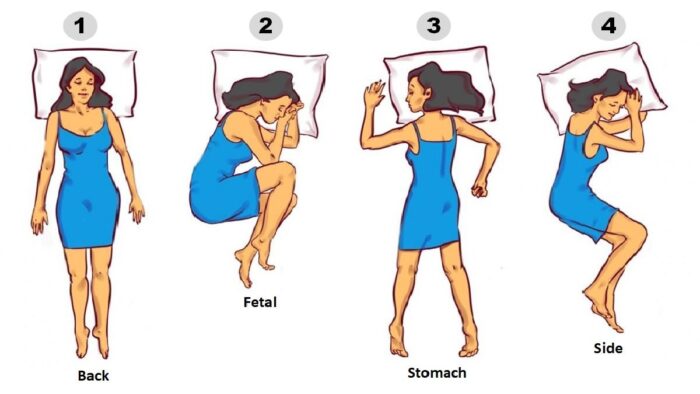
1. The Supine Position (Back Sleeping Position)
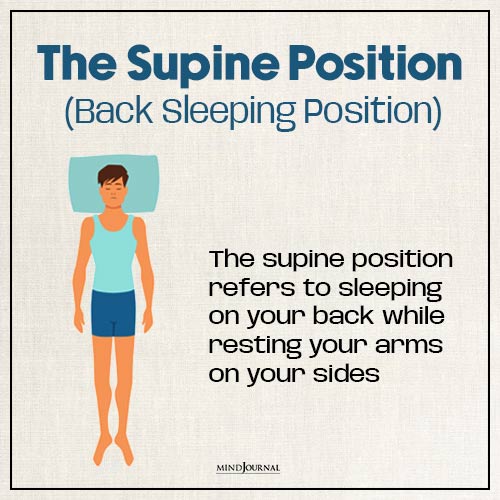
The supine position refers to sleeping on your back while resting your arms on your sides. This position is often recommended for sleeping by experts as it evenly distributes the weight on the spine.
It also aligns your spine, neck and head naturally, making it one of the best sleeping positions. It can also facilitate clear skin as your face is away from the pillow and is contact free, thereby decreasing the chances of acne or wrinkles.
Benefits:
i. It helps with spinal alignment by distributing your body weight equally on your back. It enables your spine to sustain the natural curvature while you sleep.
ii. Sleeping on your back can relieve symptoms of acid reflux. As your head rests upon the pillow, it is kept elevated above your stomach, helping to manage acid reflux.
iii. As you sleep on your back, your face avoids direct contact with the pillow which reduces your chances of having wrinkles or sleep lines.
Related: Overthinking Before Sleep? 8 Ways To Avoid Racing Thoughts At Night And Sleep Better
Considerations:
a. If you have sleep apnea or if you are prone to snoring, then the supine position can make your conditions worse. It may disrupt your breathing as you sleep on your back by making your tongue block the airway.
b. It has been observed that some people have experienced lower back pain after sleeping on the back consistently. As there is no support for your spine’s natural curvature, it can increase the risk of lower back pain.
2. The Fetal Position (Side Sleeping Position)
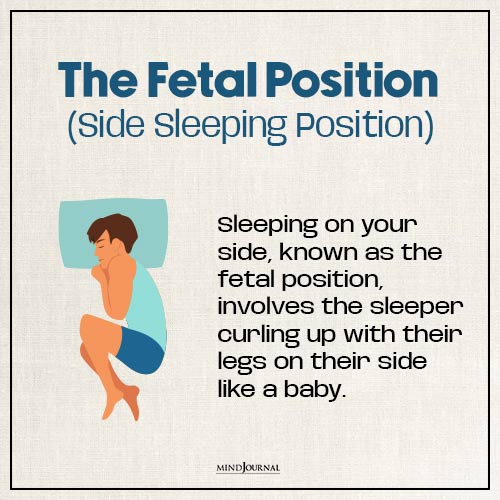
Sleeping on your side, known as the fetal position, involves the sleeper curling up with their legs on their side like a baby. This is perhaps the most popular types of sleeping position with over 60% of individuals preferring the fetal position for sleeping.
It offers a sense of safety, security, warmth and comfort and that is perhaps why a lot of people use the fetal position. This position is also popular among older adults as side sleeping provides comfort to those who have reduced spinal flexibility due to age.
Benefits:
i. Sleeping on your side improves breathing and airflow and reduces the chances of snoring.
ii. When you sleep on your left side, it helps to improve your digestion by promoting the passage of food along your digestive system through gravity. Sleeping on your right helps to improve your heart rate and blood pressure as this position puts less pressure in your heart.
iii. The fetal position also helps to relieve sleep apnea symptoms by eliminating obstruction and helping to open up the airway.
Considerations:
a. It can increase or worsen pain in shoulders and hips by putting pressure and strain on them when the sleeper curls up too much. That’s why it is essential to have comfortable pillows and a mattress.
b. Side sleeping can cause acne and facial wrinkles as the sleeper tends to press their face on the pillow repeatedly.
3. The Prone Position (Stomach Sleeping Position)
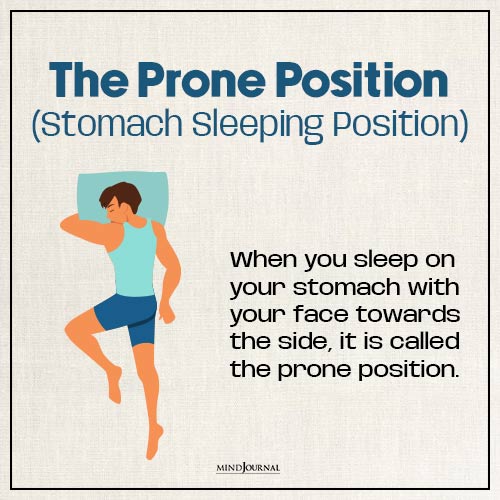
When you sleep on your stomach with your face towards the side, it is called the prone position. This is perhaps the least uncommon types of sleeping position. This position can help to open up the airway and reduce snoring.
However, this position can result in less restful and relaxing sleep as the sleeper uses a lot of energy to breathe as the ribs fight gravity. Moreover, the prone position can flatten your spine’s natural curvature, cause back pain, block the airway and affect sensitive muscles in neck and back.
Benefits:
i. The prone position helps to reduce snoring and keeps your air passages open.
ii. Sleeping on your stomach can help people with mild sleep apnea by reducing the chances of airway obstruction.
Considerations:
a. One of the drawbacks of this sleeping position is turning your head to the side in order to breathe as you lie on your stomach. Stomach sleeping can result in long-term discomfort and health issues as it can seriously strain your spine and neck.
b. This sleeping position can misalign your spine’s natural alignment and lead to chronic back pain.
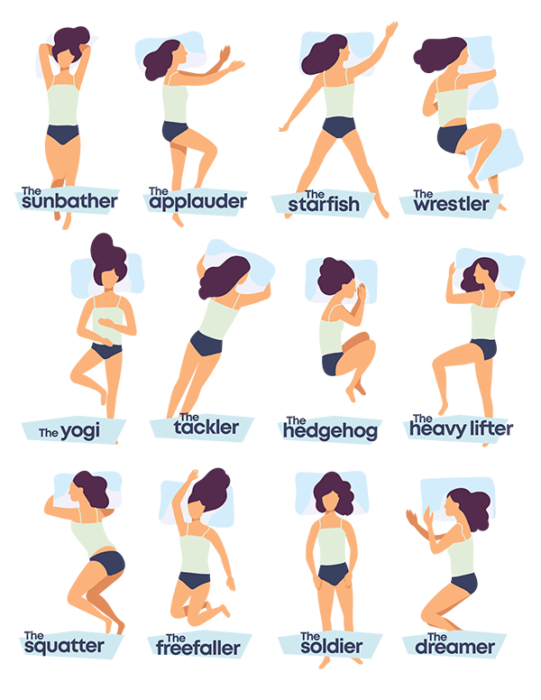
4. The Soldier Position
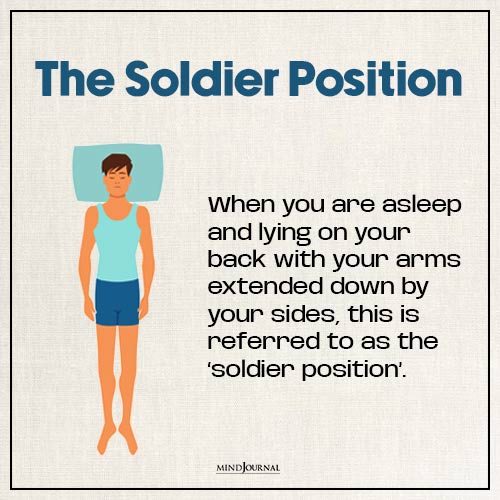
When you are asleep and lying on your back with your arms extended down by your sides, this is referred to as the ‘soldier position’. It is much like the supine position but with the arms kept straight rather than relaxed.
Benefits:
i. The soldier position has good spinal alignment which can help alleviate back and neck pain.
ii. Sleeping in this position can prevent acid reflux when you raise the upper part of your body slightly.
iii. Since your face does not get pressed into a pillow, the soldier position could slow down wrinkle formation and sleep lines on the face.
Considerations:
a. Like supine position, your symptoms of snoring and sleep apnea may worsen with the soldier position.
b. Make sure to have proper lower back support as it can help to maintain your natural curvature of the spine. Else, it can lead to long-term back pain.
5. The Starfish Position
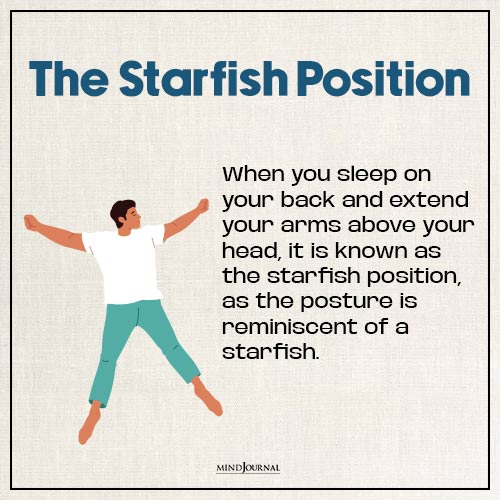
When you sleep on your back and extend your arms above your head, it is known as the starfish position, as the posture is reminiscent of a starfish. This is one of the fairly popular types of sleeping position.
Benefits:
i. Starfish position ensures that there is appropriate spinal alignment which helps in reducing pressure points in the body.
ii. When someone sleeps on their back, it helps maintain an open airway, decreasing chances of snoring and sleep apnea.
Considerations:
a. In order to avoid discomfort and strain in the starfish position, it is important to have adequate shoulder and lower back support.
b. Most individuals tend to find it difficult to maintain the starfish position throughout the night, resulting in randomly tossing and turning. This can prevent your chances of uninterrupted and restful sleep.
Related: Health Benefits Of Darkness: 4 Reasons Why You Should Sleep In The Dark, Not With The Lights On
6. The Freefall Position
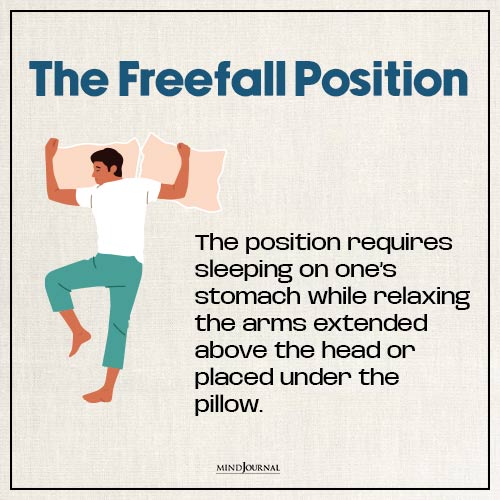
The position requires sleeping on one’s stomach while relaxing the arms extended above the head or placed under the pillow.
Benefits:
i. The freefall position can prevent snoring by keeping your airways open.
ii. Indigestion and acid reflux may be relieved by this position.
Considerations:
a. Stomach sleeping can strain the neck and spine, leading to pain and long-term problems.
b. The pressure on the chest could make it uncomfortable for some to breathe in a freefall position.
7. The Yearner Position
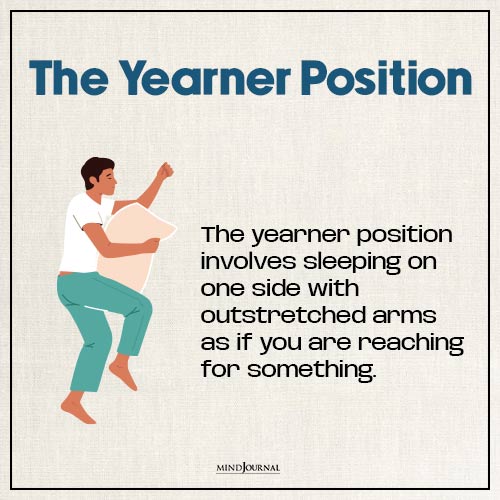
The yearner position involves sleeping on one side with outstretched arms as if you are reaching for something. This is one of the most comfortable types of sleeping position.
Benefits:
i. With better airflow, the yearner position makes you less likely to snore.
ii. Side sleeping helps maintain the natural curvature of your spine.
Considerations:
a. In order to avoid shoulder & hip pain while sleeping in the yearner positions, make sure to have a supportive mattress & pillow.
b. Pressing your face against a pillow repeatedly can contribute to having wrinkles over time.
Remember that the goal is to find a sleeping posture that guarantees waking up refreshed and pain-free. Each sleeping pose has its benefits as well as considerations. So make sure to pay attention to any adjustments required by your body.
Things to Consider
Here are some other factors that you need to think about when considering the best sleeping posture for you –
1. Mattress and Pillow Selection
Irrespective of the position you sleep in, choosing the right mattress and pillow is vital. For most people, a medium-firm mattress offers great support to their bodies, ensuring spinal alignment.
Furthermore, using the correct pillow that suits your sleeping style ensures proper neck and head alignment.
2. Lifestyle and Health Considerations
Your lifestyle, habits and health issues may influence the best position for you to sleep in. One example would be when pregnant women are advised to sleep on their left side because it enables blood flow to the fetus.
For others with respiratory conditions, it might be necessary to raise the upper body while sleeping.
3. Experiment with Your Body and Listen
The best types of sleeping position is the one that leaves you feeling refreshed in the morning when you wake up and free from pain. It is necessary to try out different positions and listen to what your body tells you.
And watch out for how you feel after waking up so that changes can be made accordingly.
Related: 8 Amazing Benefits Of Sleeping Naked, Backed By Science
How Does Sleeping Position Affect Health?
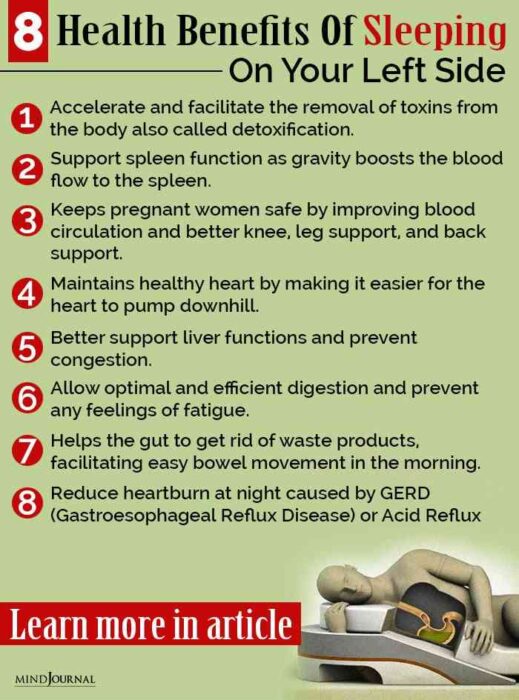
As we have learned, different types of sleeping position have different types of effects on your health. The perfect sleeping position can vary greatly from person to person. But you should be very careful about how you sleep as it can help to prevent body aches, promote good spinal alignment and support the natural curves of your body.
So how does sleeping position affect health? Here’s how –
1. Spinal Alignment and Back Sleeping (Supine Position)
How you sleep actually plays a vital role in maintaining the alignment of your spine. Using the right pillows and mattress to lie on your back can help keep your spine neutral reducing risk of back and neck pain.
2. Breathing Patterns and Side Sleeping (Fetal Position)
Acid reflux and snoring can be eased by sleeping on the side. This helps to keep the airways open for better breathing during sleep.
3. Neck and Spine Strain with Stomach Sleeping (Prone Position)
Neck and spine strain may result from sleeping on your stomach, leading to discomfort, and future problems. It can also cause breathing problems and disrupt your sleep.
4. Skin Health and Wrinkles
Different positions for sleep have different effects on skin health. When you sleep on your back, you avoid creating sleep lines that lead to wrinkles, while side or stomach sleeping could cause them.
Your choice of a sleeping position should consider your health needs as it influences such issues as spinal health, breathing patterns as well as skin condition. This is the answer to how does sleeping position affect health.
What is the perfect posture to sleep?
It is widely believed by experts that the perfect posture to sleep is the supine position or sleeping on your back with proper support from your mattress and pillows. It helps to reduce the risk of neck and back pain, promote spinal alignment, improve breathing and reduce snoring and sleep apnea.
However, the perfect posture to sleep for you depends on your health and preferences. If you feel discomfort in a particular posture no matter how beneficial it may be for you, then you can tweak it as per your needs so that you feel comfortable, relaxed and healthy while sleeping.
Simply pay attention to what your body is telling you and you will easily find the perfect sleeping posture.
Related: How To Fall Asleep In 2 Minutes: Mastering The Military Sleep Technique
Takeaway
Quality of your sleep and your health depends largely on how you position yourself during sleep. Knowledge about the benefits and drawbacks about different types of sleeping position can help you decide accordingly.
Remember to have comfortable pillows and mattress and experiment with different sleeping styles until you find the one that suits you best.
Here’s to restful nights and refreshing mornings.
Happy sleeping!
Frequently Asked Questions (FAQs):
Which is the healthiest sleep position?
Sleeping on your back is considered the healthiest as it promotes spinal alignment, decreases back pain, and improves breathing and overall well-being.
What is the best position to sleep together?
Spooning or side-by-side sleeping positions often foster intimacy and comfort for spouses and couples.
What is the rarest sleeping position?
The fetal position with the arms stretched out straight is regarded the most uncommon posture among adults during sleep.
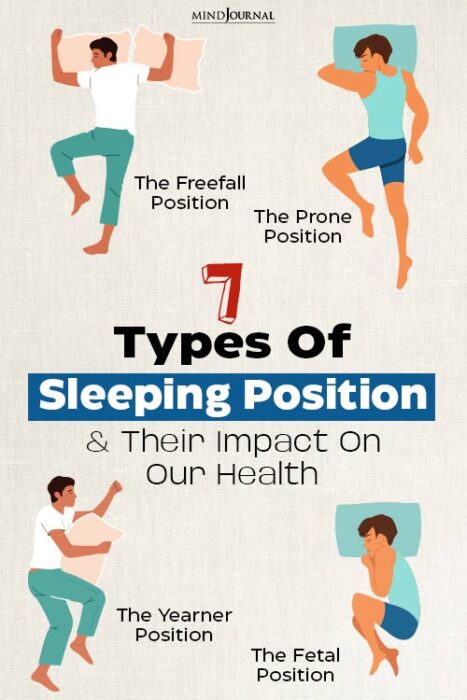
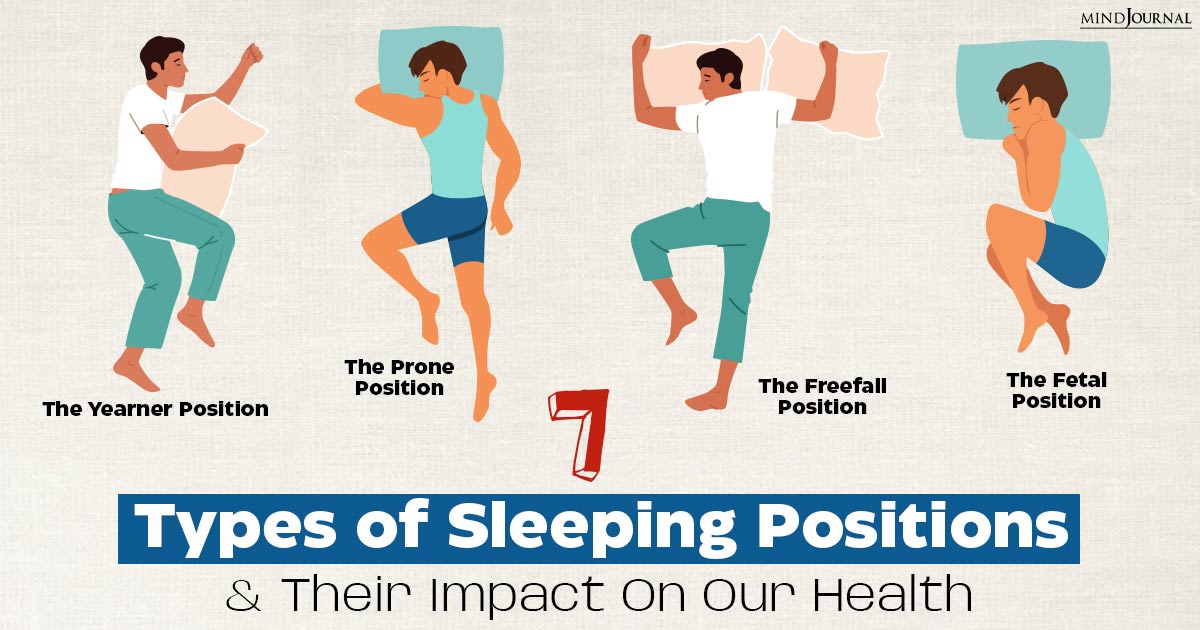
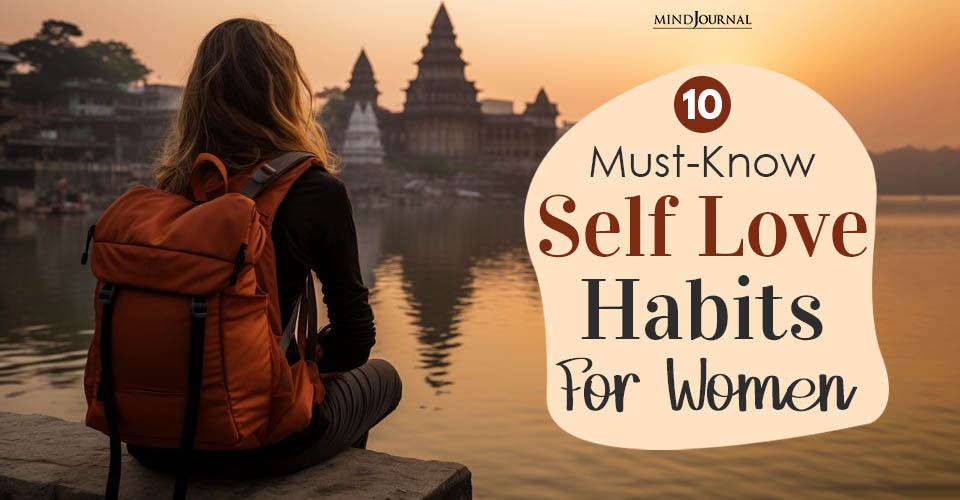






Leave a Reply
You must be logged in to post a comment.